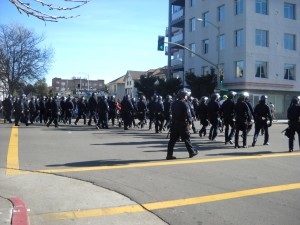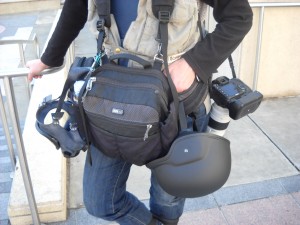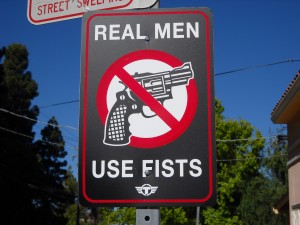
Cops follow protesters last week in Oakland

This is how a news photographer accessorizes

Is this sign posted in every Press Club in the USA?
“A Nation of Sheep,” written by William J. Lederer has been on our literary radar screen for many years just because of the catchy title. When we were presented with the chance to buy a used copy in BU (Brilliant Uncirculated) condition recently, at a bargain price, we snapped it up quickly. Among the usual suspects list of places in Berkeley CA where a thrifty fellow can buy desirable additions for one’s personal library at prices that won’t destroy a tight budget, the number of available books that criticize American Journalism seems astoundingly high, until a proper assessment of the phenomenon is made. The University located in Berkeley has a School of Journalism, so there is going to be a goodly number of teachers and students reading up on that subject. There is also a number of folks who work in and around the San Francisco Bay area Journalism community who live in Berkeley. There are also a few people still living in Berkeley who can tell stories about the golden age of underground newspapers because they worked for the Berkeley Barb and the Berkeley Tribe.
That, in turn, reminded us of the fact that the World’s Laziest Journalist has intended for some time to write a column about the fact that Berkeley has no Press Club. If some enterprising coffee shop owner (apparently the Berkeley Barb was started by a coffee shop owner who wanted a small “poopsheet” to hand out to his regular customers) wanted to fill his place on an “off” evening, he could set aside one night a week to make a special effort to attract “newsies” and start a de facto Press Club, where a herd of the boys could gather around and talk shop.
[We can use the sexist word “boys” because we heard a recent report about a new book on KCBS that reports that there is a paucity of women in the clique of reporters covering this year’s Presidential Campaign.]
Recently Police officials have been making decisions based on the fact that they don’t consider some reporters for Internets based publications to be eligible for Press Pass status at news events. That could be a lively topic for discussion at the aforementioned hypothetical gathering just mentioned.
In the San Francisco Bay Area, the big topic among journalists for the past week, was not the Romney victory in the Florida primary, but the detention of reporters in Oakland. Some of the detained journalists had valid Press Passes issued by the San Francisco Police Department. Maybe, if well informed voters are a legitimate goal, it is time to include web-journalists on the list of those eligible to apply for Police issued Press Passes?
Citizens and media owners seem eerily silent about this latest trend in journalism; could it be that they don’t care about the health and welfare of America’s free press?
It would be a bit easier to write a weekend-update column, if a fellow could compare notes at an impromptu Press Club. Macy’s may not tell Gimbel’s what’s going to go on sale next week, but journalist do talk to each other on an “this is off the record” basis and swap some information which can help determine the newsworthyness of some topics.
For instance, what if an online columnist noted that during the past week there had been some headlines online that indicated that a nuclear facility in Illinois had a bit of trouble with their hardware, the San Onofre nuclear plant in Southern California had a radioactive leak, and a big shot in Washington had announced that the next terrorist attack on the USA might come in the form of a hack attack.
Wasn’t there a story recently alleging that somebody had used computers to sabotage and slow down Iran’s program to develop nuclear weapons?
If there was an informal Press Club in Berkeley, a columnist could do a bit of a mini-opinion poll about the feasibility of seeing a connecting thread for those bits of information? Could the nuclear malfunctions be an example of “paybacks are hell”?
If other journalists thought that all these separate bits of information could be lumped together legitimately, then OK, but if they said it didn’t pass the smell test, then it might be prudent to pass on the idea.
On line, anything that isn’t stamped USDA approved mainstream media style patriotic information will be branded as sounding suspiciously like something being prepared for test marketing by the Amalgamated Conspiracy Theory Factory boys (rumored to be headquartered in an abandoned railroad car manufacturing facility in Emeryville CA?) and not worthy of a mention. The catch phrase for the teen years (of this century) might be: “You’re on your own, pal.” [Bust the unions and stress rugged individualism.]
Didn’t a legendary pioneer blogger, whose handle was Plato, once predict that eventually journalism would become a game played by guys sitting in their man cave looking at a computer screen thinking they were grasping reality and making cogent remarks in a process known as “live blogging”? Don’t they deserve to get a night out to break the shackles of solipsism?
Sure, it is wonderfully invigorating to see younger journalists tilting at windmills, but don’t they need to hear a crusty old reporter reminding them: “Ya can’t fight City Hall, kid!”? A Berkeley Press Club would help keep such idealistic young j-students grounded in reality. The flip side of the coin would be that the students could help the old war horse scribblers fathom the mysteries of the laptop.
There is one other stealth advantage to having a local Press Club where journalists can talk shop. If a writer tells his colleagues about a story he is writing and if something happens to him while he is digging for that story, then the others will be able to continue the (hypothetical alert!) the crusade that cost a life.
Wasn’t columnist Dorothy Kilgallen working on an angle to the Kennedy assassination when she died suddenly?
Has IBM abandoned their use of plaques that displayed the word “THINK”?
On page 31 of the Crest Book 1962 paperback edition of “A Nation of Sheep,” William J. Lederer quotes a Prince/editor from Thailand as saying: “You Americans are the easiest country in the world to propagandize. You believe anything. I could give a lecture here in Honolulu and say that the king’s mother had two heads – and that is why she isn’t seen in public. Most of the audience would believe it and the papers would probably print it as a factual story – without even checking to see if His Majesty’s mother is still alive.”
Now the disk jockey will play the Defiant Ones’ 1961 recording of “Defiant Drums,” Elvis’ “Rock-A-Hula Baby” and Johnny Cash’s “Guess Things Happen That Way.” We have to go read Edward Jay Epstein’s 1973 book “News from Nowhere.” Have a “Cross my heart and hope to die” type week.
A Nation of (Silent?) Sheep?
Cops follow protesters last week in Oakland
This is how a news photographer accessorizes
Is this sign posted in every Press Club in the USA?
“A Nation of Sheep,” written by William J. Lederer has been on our literary radar screen for many years just because of the catchy title. When we were presented with the chance to buy a used copy in BU (Brilliant Uncirculated) condition recently, at a bargain price, we snapped it up quickly. Among the usual suspects list of places in Berkeley CA where a thrifty fellow can buy desirable additions for one’s personal library at prices that won’t destroy a tight budget, the number of available books that criticize American Journalism seems astoundingly high, until a proper assessment of the phenomenon is made. The University located in Berkeley has a School of Journalism, so there is going to be a goodly number of teachers and students reading up on that subject. There is also a number of folks who work in and around the San Francisco Bay area Journalism community who live in Berkeley. There are also a few people still living in Berkeley who can tell stories about the golden age of underground newspapers because they worked for the Berkeley Barb and the Berkeley Tribe.
That, in turn, reminded us of the fact that the World’s Laziest Journalist has intended for some time to write a column about the fact that Berkeley has no Press Club. If some enterprising coffee shop owner (apparently the Berkeley Barb was started by a coffee shop owner who wanted a small “poopsheet” to hand out to his regular customers) wanted to fill his place on an “off” evening, he could set aside one night a week to make a special effort to attract “newsies” and start a de facto Press Club, where a herd of the boys could gather around and talk shop.
[We can use the sexist word “boys” because we heard a recent report about a new book on KCBS that reports that there is a paucity of women in the clique of reporters covering this year’s Presidential Campaign.]
Recently Police officials have been making decisions based on the fact that they don’t consider some reporters for Internets based publications to be eligible for Press Pass status at news events. That could be a lively topic for discussion at the aforementioned hypothetical gathering just mentioned.
In the San Francisco Bay Area, the big topic among journalists for the past week, was not the Romney victory in the Florida primary, but the detention of reporters in Oakland. Some of the detained journalists had valid Press Passes issued by the San Francisco Police Department. Maybe, if well informed voters are a legitimate goal, it is time to include web-journalists on the list of those eligible to apply for Police issued Press Passes?
Citizens and media owners seem eerily silent about this latest trend in journalism; could it be that they don’t care about the health and welfare of America’s free press?
It would be a bit easier to write a weekend-update column, if a fellow could compare notes at an impromptu Press Club. Macy’s may not tell Gimbel’s what’s going to go on sale next week, but journalist do talk to each other on an “this is off the record” basis and swap some information which can help determine the newsworthyness of some topics.
For instance, what if an online columnist noted that during the past week there had been some headlines online that indicated that a nuclear facility in Illinois had a bit of trouble with their hardware, the San Onofre nuclear plant in Southern California had a radioactive leak, and a big shot in Washington had announced that the next terrorist attack on the USA might come in the form of a hack attack.
Wasn’t there a story recently alleging that somebody had used computers to sabotage and slow down Iran’s program to develop nuclear weapons?
If there was an informal Press Club in Berkeley, a columnist could do a bit of a mini-opinion poll about the feasibility of seeing a connecting thread for those bits of information? Could the nuclear malfunctions be an example of “paybacks are hell”?
If other journalists thought that all these separate bits of information could be lumped together legitimately, then OK, but if they said it didn’t pass the smell test, then it might be prudent to pass on the idea.
On line, anything that isn’t stamped USDA approved mainstream media style patriotic information will be branded as sounding suspiciously like something being prepared for test marketing by the Amalgamated Conspiracy Theory Factory boys (rumored to be headquartered in an abandoned railroad car manufacturing facility in Emeryville CA?) and not worthy of a mention. The catch phrase for the teen years (of this century) might be: “You’re on your own, pal.” [Bust the unions and stress rugged individualism.]
Didn’t a legendary pioneer blogger, whose handle was Plato, once predict that eventually journalism would become a game played by guys sitting in their man cave looking at a computer screen thinking they were grasping reality and making cogent remarks in a process known as “live blogging”? Don’t they deserve to get a night out to break the shackles of solipsism?
Sure, it is wonderfully invigorating to see younger journalists tilting at windmills, but don’t they need to hear a crusty old reporter reminding them: “Ya can’t fight City Hall, kid!”? A Berkeley Press Club would help keep such idealistic young j-students grounded in reality. The flip side of the coin would be that the students could help the old war horse scribblers fathom the mysteries of the laptop.
There is one other stealth advantage to having a local Press Club where journalists can talk shop. If a writer tells his colleagues about a story he is writing and if something happens to him while he is digging for that story, then the others will be able to continue the (hypothetical alert!) the crusade that cost a life.
Wasn’t columnist Dorothy Kilgallen working on an angle to the Kennedy assassination when she died suddenly?
Has IBM abandoned their use of plaques that displayed the word “THINK”?
On page 31 of the Crest Book 1962 paperback edition of “A Nation of Sheep,” William J. Lederer quotes a Prince/editor from Thailand as saying: “You Americans are the easiest country in the world to propagandize. You believe anything. I could give a lecture here in Honolulu and say that the king’s mother had two heads – and that is why she isn’t seen in public. Most of the audience would believe it and the papers would probably print it as a factual story – without even checking to see if His Majesty’s mother is still alive.”
Now the disk jockey will play the Defiant Ones’ 1961 recording of “Defiant Drums,” Elvis’ “Rock-A-Hula Baby” and Johnny Cash’s “Guess Things Happen That Way.” We have to go read Edward Jay Epstein’s 1973 book “News from Nowhere.” Have a “Cross my heart and hope to die” type week.